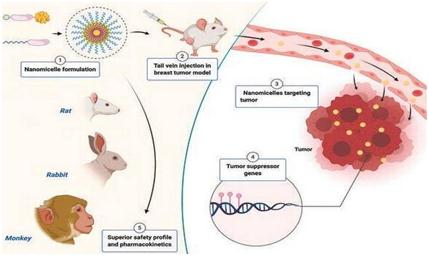

With the advance in nanotechnology, researchers across the globe have been exploring how to use nanoparticles for efficient drug delivery. Now researchers have created a nanomicelle that can be used to deliver a drug named docetaxel, which is commonly used to treat various cancers including breast, colon and lung cancer.
Context
With the advance in nanotechnology, researchers across the globe have been exploring how to use nanoparticles for efficient drug delivery. Now researchers have created a nanomicelle that can be used to deliver a drug named docetaxel, which is commonly used to treat various cancers including breast, colon and lung cancer.
About
- Similar to nanoshells and nanovesicles, nanomicellesare extremely small structures and have been noted as an emerging platform in targeted therapy.
- Nanomicelles are globe-like structures with a hydrophilic outer shell and a hydrophobic interior.
- The hydrophobic core interacts with hydrophobic drugs/agents, whereas the hydrophilic tail helps surrounding with water and enhances solubility.
- This dual property makes them a perfect carrier for delivering drug molecules.
- The nanomicelles are less than 100nm in size and are stable at room temperature.
- Once injected intravenously these nanomicelles can easily escape the circulation and enter the solid tumours where the blood vessels are found to be leaky.
Advantages
- Nanomicelles offer many advantages, including
- small size (10–50 nm)
- structural stability
- less toxicity
- ability to entrap large amounts of hydrophobic drugs/contrast agent and solubilize in water
- conjugation with target ligand and stimuli-sensitive regions
The need
- The ideal goal for cancer therapy is destroying the cancer cells without harming healthy cells of the body, and chemotherapeutics approved for treatment of cancer are highly toxic.
- The currently used docetaxel is a highly hydrophobic drug, and is dissolved in a chemical mixture (polysorbate-80 and alcohol).
- This aggravates its toxic effects on liver, blood cells, and lungs.
- It necessiated urgent and unmet need to develop effective drug delivery vehicles for docetaxel without these side effects.



